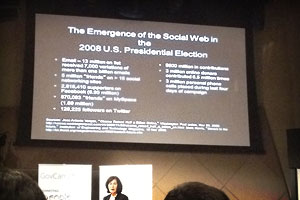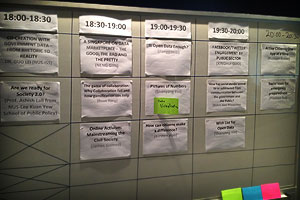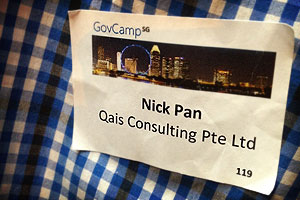
I was at the first GovCamp Singapore earlier this year and am glad and went for the second one on 18th November 2011. You can see the full agenda here. Was slightly late, but managed to catch the Keynote by Jane Fountain. Her role is super cool, she is the Professor of Political Science and Public Policy, University of Massachusetts Amherst; Director, National Center for Digital Government. Anyone’s title that have the term “Digital Government” is super cool.
There was a lot of talk about social media and from her sharing, she have clearly studied many countries and how Governments use social media. She made a good point that in the 1960 Presidential Elections between Nixon and Kennedy, television was a new technology and it was also the very first time a live televised presidential debate was held . Without a doubt, how the candidates looked on television was apparently how the public judged their capability to govern. Its quite superficial, but thats reality. This draws a very good parallel on how our current politicians in Singapore are judged by the way they use social media.
Following that, there was a panel discussion by Jane Fountain, James Kang (Assistant Chief Executive, IDA), Prof Ashish Lall (LKY School of Public Policy) and Dr Pallab Saha (Institute of Systems Science at NUS). There was a lot of talk about data privacy and its good to know that there will be a new data-protection legislation in Singapore come first half of next year. Yay, no more random sales calls.

That was then followed by food and beer. If I don’t recall wrongly, they were actually serving Schneider Weisse beer and I have to say its pretty good. Then came the main event which was the breakout sessions. There were quite a number of good one and the first I went to was Prof Ashish Lall’s session about Society 2.0.
It was quite an intellectual discussion carried out in plain simple english. Basically, everyone was challenged that if we wanted change, we should do something about it and not wait for someone else to do it.
A few cool sites he shared:
- Give a Minute! – An suggestion platform that asks the public what would make them use walk, bike, but or train more. Over a period of 13 months, there were 3000 suggestions and 97% of them were on topic.
- Public Insight Network – A site that connects Media to experts. Experts not by the title of where they work or paper qualifications, but real experts. Even experts from super niche fields.
- InnoCentive – Where it aims to matchmake people who have a problem to people who like solving problems.
- The Billion Prices Project @ MIT –
- PriceStats – A site that collects prices of products available on the net to try and measure inflation.
- The Finland Phenomenon – A documentary that reveals the surprising factors accounting for Finland’s rank as the #1 education system in the world.

I then managed to catch a few other interesting sessions as well. Yin Shanyang shared on data visualization and his work on the Melbourne transportation which was really impressive. Robin shared on Using Social Media which led to some good discussions about how local politicians used social media in the last general elections. Preetam then led the next discussion around Social Tool for Emergency Preparedness which was an open brainstorming session.
This session gave me 2 ideas:
- Why not have a website to allow commuters to volunteer their commuting habits. Where they live, when they travel, from where to where, what do they use. If there is a sizable sample size, this publicly collected data could allow the authorities to better plan public transport?
- Local developers at GovCamp mention that most data available at data.gov.sg is not really usable, hence not possible to use or create anything. However, I think why think about just Singapore? Why not use available data overseas to create the app ideas and just show the relevant authorities locally and tell them if the data is available in a particular format, then the application can immediately be used in Singapore as well. But the assumption is of cause the application is a good one.
Overall, I really enjoyed this GovCampSG and hope that it will be even better next year with even more breakout sessions and constructive ideas exchanges.
Ah… no wonder the beer tastes more like wheat beer than normal lager. I like it very much.
Idea 1 is a great crowdsourcing idea. Similar idea was presented to LTA some years back but it didn’t get picked up. Now, if citizens were to take this to our hands, we could run a campaign using mobile apps check-in (foursquare, Facebook check-in, Google check-in). May need to have some instructions on tagging or commenting the check-ins to help data organization. Otherwise I guess it is not hard to develop an app for this purpose. Once more people starts to check-in from source to transfer points to destination, location and time are captured, and analysis can begin. Even better if the app can auto check-in based on GPS location and movement, like Google check-in does, and it will encourage participation.
I did the above check-ins myself early this year after I moved to a new place, just to time how long it took from home to work by public transport. Every morning, I used foursquare to check-in at the bus stop at my block, at various transfer points and finally when I reach office. When I reached my office, I opened fourquare history, and copied the check-in time of all transport points to Google Docs (manual copy-paste here but manageable).
After 8 weeks of data collection, I plotted a line chart of check-in time of all transfer points for each day. Besides the average travelling time from end to end, the chart also confirms the common problem in the public transport system — the first mile and last mile problem where buses are hopelessly unable to shuttle people to and fro MRT station in a predictable and timely manner, especially in peak hours. Well, the first/last mile problem can also be observed from personal experience, but it can quite hazy, I think, and it is good to see the data staring at you and says, “hey, look, here’s the evidence.” I think with more participants and check-in data, we can uncover more patterns and hence opportunities for innovation in public transport.
Thanks for sharing your GovCamp experience. Cheers.